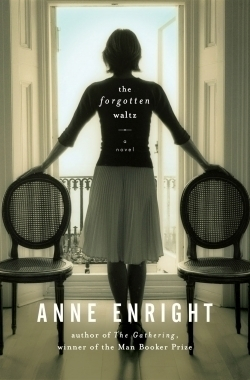The Forgotten Waltz
“I was huge! I was horny! I was … careful. When I looked at Séan, and he at me, it was always eye to eye.” This is the compelling and candid voice of Gina Moynihan, the snarky and sensual thirty-four-year-old narrator of Anne Enright’s new novel, The Forgotten Waltz. As a follow-up to The Gathering, which won the Man Booker prize, Enright delivers a sophisticated and comic novel of adultery. A contemporary work for contemporary times, it spans seven years, from 2002 to 2009, just before Ireland’s descent into financial turmoil, when people were spending and times were good.
Gina works in IT and is married to Conor, with whom she fell in love because it was “the right thing to do.” But when she spots Séan in her sister’s backyard, Gina registers a faint premonition that they will know each other. She doesn’t speak to him then, but a few years later during a business trip their affair begins with a cliché night of drunken sex. Séan is married, successful, and settled into suburbia. Enright brilliantly dissects the emotional shifts, the pathos, and the secrecy of the affair as Gina gradually falls in love with Séan and eventually he with her. As they become more involved, there is an issue that creates tension between them—Séan’s strange young daughter, Evie.
Even though the novel begins and ends with Evie, she only surfaces occasionally. Because the story is not linear, told in fragmented memories, there is not a true sense of how her presence creates tension. But when Gina and Séan finally move in together, it’s clear that Evie is the part of Séan Gina cannot possess and ultimately makes her feel the outsider.
If it weren’t for her masterful stylistic prose and pitch-perfect distillation of the small moments between people, the book’s lack of narrative tension would be difficult to overcome. Yet Enright manages to interest the reader with the brio of her writing and the force of Gina’s voice.
Although this work is not as tidy as The Gathering, readers will be impressed by its refinement and unwavering voice. This is not a plot-driven book, but a novel presenting tawdriness, selfishness, and love through a character’s emotional associations. A successful read that will please Enright fans and those who know that life isn’t full of happy endings but, with any luck, at least the ability to understand our own attempts at happiness.
Reviewed by
Monica Carter
Disclosure: This article is not an endorsement, but a review. The publisher of this book provided free copies of the book to have their book reviewed by a professional reviewer. No fee was paid by the publisher for this review. Foreword Reviews only recommends books that we love. Foreword Magazine, Inc. is disclosing this in accordance with the Federal Trade Commission’s 16 CFR, Part 255.

